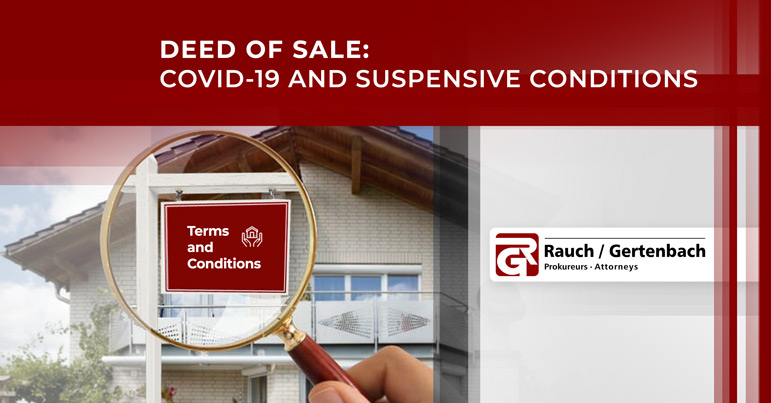DEED OF SALE: COVID-19 AND SUSPENSIVE CONDITIONS
Parties to a deed of sale should keep a watchful eye on the terms and conditions of their agreement and especially suspensive conditions during the COVID-19 lockdown period.
A suspensive condition in effect suspends the enforcement of a deed of sale pending the fulfilment of the condition. The deed of sale is therefore subject to the occurrence of an uncertain future event. Typical suspensive conditions would be “subject to bond approval” or “sale of the purchaser’s property” clauses. If the condition is not met, the deed of sale lapses.
Most suspensive conditions have, or at least should have, a cut-off date in order to prevent the deed of sale pending in perpetuity. It is important to take note that if the suspensive condition is not fulfilled within the time frame provided, the deed of sale lapses and is void ab initio (void from the beginning, as if it never existed). More importantly, a lapsed deed of sale can not be revived by way of an addendum, a new deed of sale must be concluded between the parties. Our courts have held on numerous occasions that an addendum cannot revive a lapsed agreement and does not constitute a new agreement.
It has become general practice for parties to lapsed deed of sales to conclude an addendum under the impression that the agreement would be revived. This could have dire consequences for all parties involved.
Accordingly, parties to a deed of sale should arrange for the extension of the time period granted for fulfilment of suspensive conditions before the agreement lapses. In light of recent case law, amendments to deed of sales may be effected electronically unless the deed of sale provides otherwise.
In our next segment we will have a closer look at specific suspensive conditions and some practical implications thereof.
All our attorneys will be available on their cell phones and email. Please visit our website https://www.rauchgertenbach.com/ for contact details and other COVID-19 related updates.







